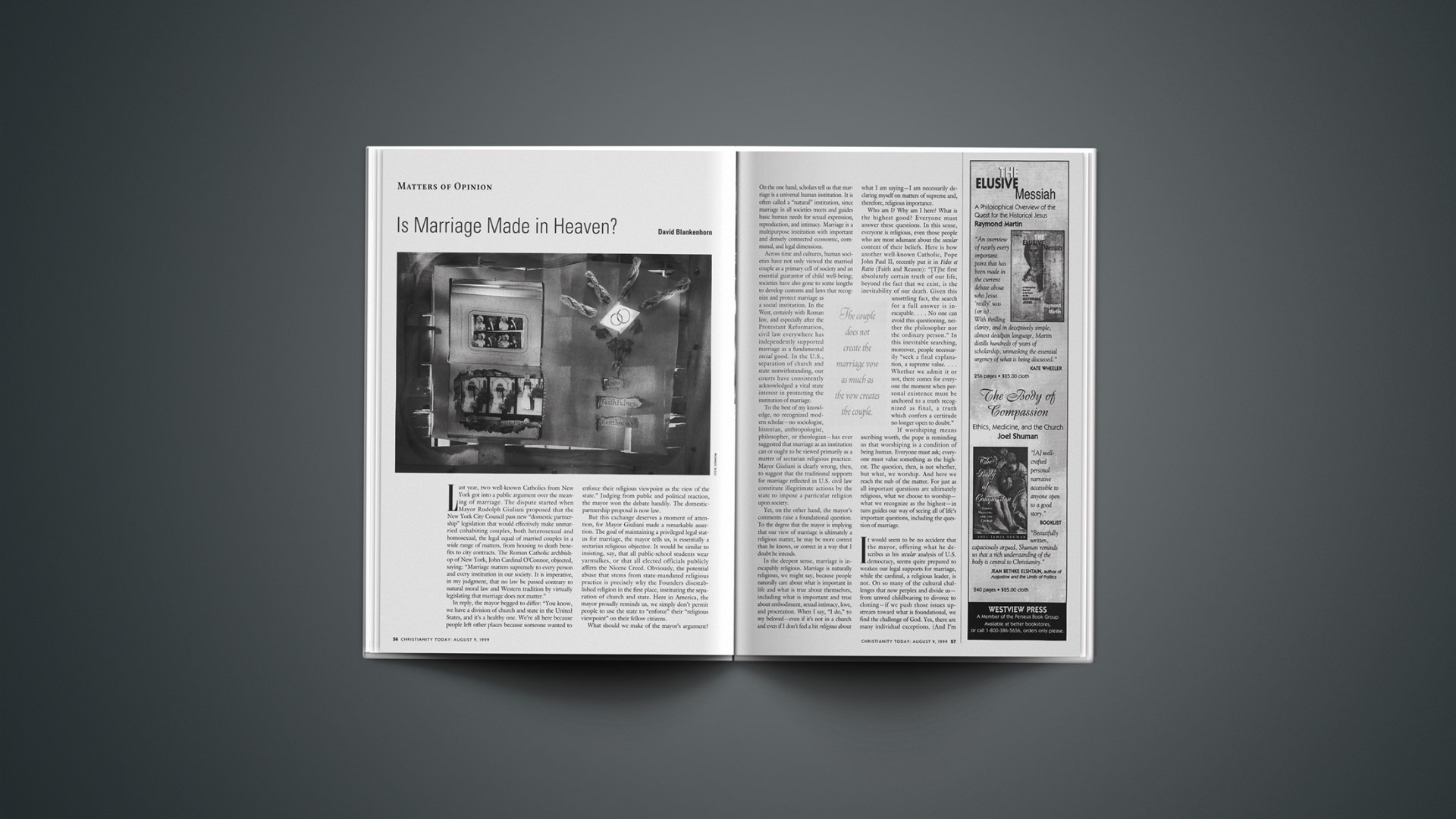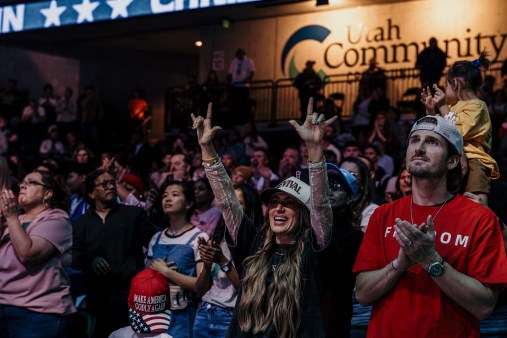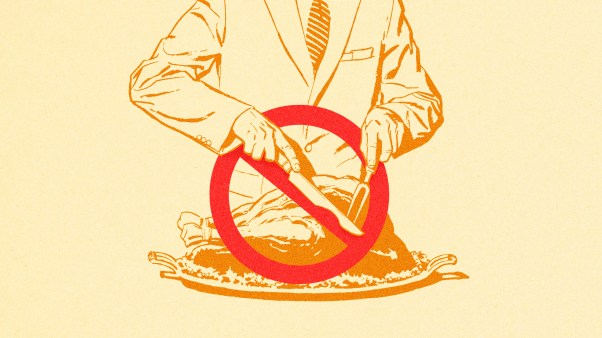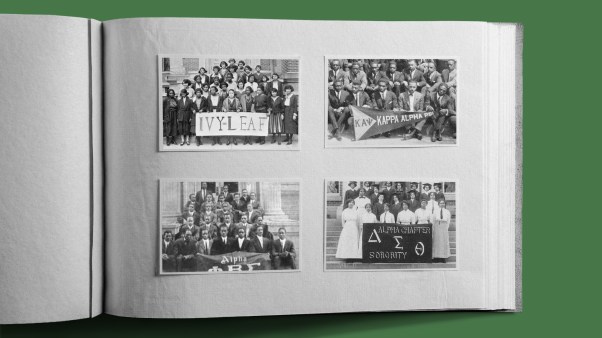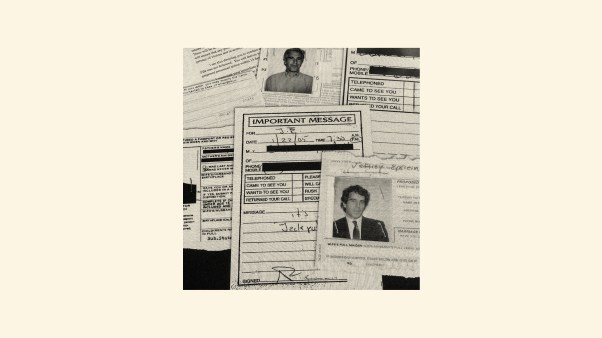Last year, two well-known Catholics from New York got into a public argument over the meaning of marriage. The dispute started when Mayor Rudolph Giuliani proposed that the New York City Council pass new “domestic partnership” legislation that would effectively make unmarried cohabiting couples, both heterosexual and homosexual, the legal equal of married couples in a wide range of matters, from housing to death benefits to city contracts. The Roman Catholic archbishop of New York, John Cardinal O’Connor, objected, saying: “Marriage matters supremely to every person and every institution in our society. It is imperative, in my judgment, that no law be passed contrary to natural moral law and Western tradition by virtually legislating that marriage does not matter.”
In reply, the mayor begged to differ: “You know, we have a division of church and state in the United States, and it’s a healthy one. We’re all here because people left other places because someone wanted to enforce their religious viewpoint as the view of the state.” Judging from public and political reaction, the mayor won the debate handily. The domestic-partnership proposal is now law.
But this exchange deserves a moment of attention, for Mayor Giuliani made a remarkable assertion. The goal of maintaining a privileged legal status for marriage, the mayor tells us, is essentially a sectarian religious objective. It would be similar to insisting, say, that all public-school students wear yarmulkes, or that all elected officials publicly affirm the Nicene Creed. Obviously, the potential abuse that stems from state-mandated religious practice is precisely why the Founders disestablished religion in the first place, instituting the separation of church and state. Here in America, the mayor proudly reminds us, we simply don’t permit people to use the state to “enforce” their “religious viewpoint” on their fellow citizens.
What should we make of the mayor’s argument? On the one hand, scholars tell us that marriage is a universal human institution. It is often called a “natural” institution, since marriage in all societies meets and guides basic human needs for sexual expression, reproduction, and intimacy. Marriage is a multipurpose institution with important and densely connected economic, communal, and legal dimensions.
Across time and cultures, human societies have not only viewed the married couple as a primary cell of society and an essential guarantor of child well-being; societies have also gone to some lengths to develop customs and laws that recognize and protect marriage as a social institution. In the West, certainly with Roman law, and especially after the Protestant Reformation, civil law everywhere has independently supported marriage as a fundamental social good. In the U.S., separation of church and state not withstanding, our courts have consistently acknowledged a vital state interest in protecting the institution of marriage.
To the best of my knowledge, no recognized modern scholar—no sociologist, historian, anthropologist, philosopher, or theologian—has ever suggested that marriage as an institution can or ought to be viewed primarily as a matter of sectarian religious practice. Mayor Giuliani is clearly wrong, then, to suggest that the traditional supports for marriage reflected in U.S. civil law constitute illegitimate actions by the state to impose a particular religion upon society.
Yet, on the other hand, the mayor’s comments raise a foundational question. To the degree that the mayor is implying that our view of marriage is ultimately a religious matter, he may be more correct than he knows, or correct in a way that I doubt he intends.
In the deepest sense, marriage is in escapably religious. Marriage is naturally religious, we might say, because people naturally care about what is important in life and what is true about themselves, including what is important and true about embodiment, sexual intimacy, love, and procreation. When I say, “I do,” to my beloved—even if it’s not in a church and even if I don’t feel a bit religious about what I am saying—I am necessarily declaring myself on matters of supreme and, therefore, religious importance.
Who am I? Why am I here? What is the highest good? Everyone must answer these questions. In this sense, everyone is religious, even those people who are most adamant about the secular content of their beliefs. Here is how another well-known Catholic, Pope John Paul II, recently put it in Fides et Ratio (Faith and Reason): “[T]he first absolutely certain truth of our life, beyond the fact that we exist, is the inevitability of our death. Given this unsettling fact, the search for a full answer is in escapable . …No one can avoid this questioning, neither the philosopher nor the ordinary person.” In this inevitable searching, moreover, people necessarily “seek a final explanation, a supreme value. … Whether we admit it or not, there comes for everyone the moment when personal existence must be anchored to a truth recognized as final, a truth which confers a certitude no longer open to doubt.”
The couple does not create the marriage vow as much as the vow creates the couple.
If worshiping means ascribing worth, the pope is reminding us that worshiping is a condition of being human. Everyone must ask; everyone must value something as the highest. The question, then, is not whether, but what, we worship. And here we reach the nub of the matter. For just as all important questions are ultimately religious, what we choose to worship—what we recognize as the highest—in turn guides our way of seeing all of life’s important questions, including the question of marriage.
It would seem to be no accident that the mayor, offering what he describes as his secular analysis of U.S. democracy, seems quite prepared to weaken our legal supports for marriage, while the cardinal, a religious leader, is not. On so many of the cultural challenges that now perplex and divide us—from unwed childbearing to divorce to cloning—if we push those issues up stream toward what is foundational, we find the challenge of God. Yes, there are many individual exceptions. (And I’m not pretending to judge, or even know about, Mayor Giuliani’s personal religious beliefs.) But so often in today’s cultural debate, the orthodox followers of the God of the Jews and Christians—or for that matter, of the Muslims, Hindus, or Buddhists—tend to think a certain way about marriage; while those who worship other absolutes tend to think differently about marriage and many other issues as well.
The philosopher Richard Rorty under stands this fact. Richard Rorty is an intellectual celebrity of sorts, highly respected in certain circles for his elaboration of ideas supporting the schools of thought known as deconstructionism and postmodernism. We can fairly assume, I believe, that he and Cardinal O’Connor disagree strongly not only about marriage, but about almost everything. Yet both men insist that the main question facing us is God.
In his recent book, Achieving Our Country, one of Rorty’s core goals is to deconstruct the traditional understanding of “truth,” especially moral truth, or what the cardinal calls “natural moral law.” Watch how he clinches his argument.
Rorty wants us to “abandon the idea that one can say how things really are.” After all, what we call “truth” is merely the product of “intersubjective consensus,” not a verifiable description of some antecedent fact. Citing Andrew Delbanco’s praise for Ralph Waldo Emerson, Rorty thus announces that he “has no room for the idea of a fixed standard by which deviance from the truth could be measured and denounced.”
In offering this proposition, Rorty says that he is speaking for America. Indeed, the great promise of America, as Rorty sees it, is our “refusal to believe in the existence of Truth,” in the sense of “something which has authority over human beings.” And why is America able to free herself from such fixed standards? Because America is “the first nation-state with nobody but itself to please—not even God. We are the greatest poem because we put ourselves in the place of God. … We redefine God as our future selves.” As a result, “there is no standard, not even a divine one, against which the decisions of a free people can be measured.”
Outside of philosophy departments, this way of construing America—or, more properly, this religion—is not as widespread as Rorty seems to believe. But it’s not a foreign or newfangled faith, either; its roots run deep enough in our history and culture. Walt Whitman, probably our most famous poet of democracy, also urges his fellow citizens to “Be not curious about God, For I who am curious about each am not curious about God.” And: “I find no sweeter fat than sticks to my own bones.” Therefore this recognizably American truth claim:
From this hour I ordain myself loos’d
of limits and imaginary lines,
Going where I list, my own master total
and absolute.
Whitman and Rorty are both honest enough to pose the main question directly. What do we worship? What is the “greatest poem”? Is it God and God’s standard? Or do we substitute ourselves for God, worshiping ourselves and making ourselves our own masters “total and absolute”? Rorty plainly concedes that his entire project, particularly his goal of relativizing “Truth,” hinges upon our willingness to substitute ourselves for God. For if the external standard of moral truth is to go down, then God must surely go down, since the latter, as Rorty knows, ultimately provides the former.
One way to understand marriage, then, is to believe that we ourselves are the creators and masters of our marriages. From the perspective of this faith, the marriage vow is not an external reality or standard, but instead a subjective projection, deriving its meaning solely from the couple. In this way, the couple is bigger than the marriage; the two partners themselves become, in effect, the gods of their marriage.
But for the people of the covenant—for the sons and daughters of Abraham and Sarah who seek, however weakly, to worship God and follow God’s standard—the marriage vow is always in some measure what Peter L. Berger calls a “signal of transcendence.” The couple does not create the vow as much as the vow creates the couple. The marriage is bigger than the couple and also points to something beyond itself. Constantly reminding us that we find ourselves only through sincere self-giving, marriage encourages us to love one other person with a clarity that can give us a hint of what true love, God’s love, might be.
David Blankenhorn, president of the New Yorkbased Institute for American Values, writes Propositions, a new publication available from the institute at 1841 Broadway, Suite 211, New York, NY.
Copyright © 1999 Christianity Today. Click for reprint information.

